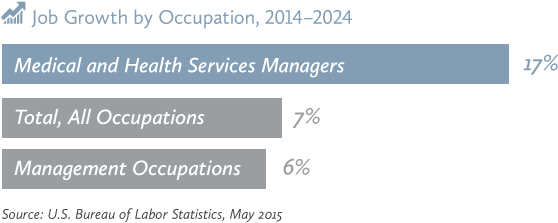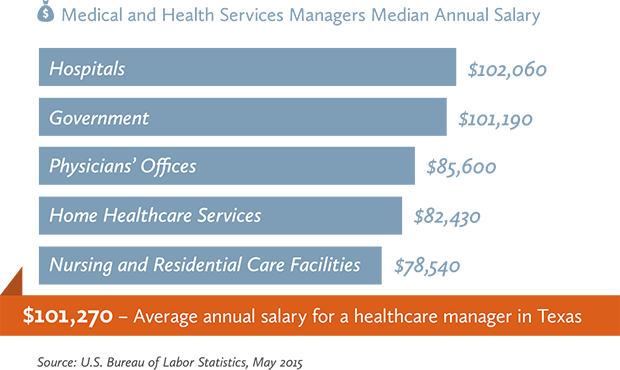Thinking of pursuing a healthcare MBA? This 8-question guide covers a variety of topics, including career opportunities, job outlook, salary information, and financial aid options. It also outlines job prospects for healthcare managers in Texas.
With a projected job growth of 19 percent between 2014 and 2024, healthcare is expected to add more jobs than any other industry. Key factors spurring this growth include more people seeking healthcare following federal health insurance reform, the healthcare needs of aging Baby Boomers and recent developments in healthcare IT and telemedicine. More healthcare consumers translates to a greater need for healthcare managers.
1. What Do Healthcare Managers Do?
Simply put, healthcare managers or healthcare executives plan, administer and coordinate the delivery of medical and health services. They also direct changes that align with developments in technology, healthcare laws and regulations.
If you’re considering a career in healthcare management, you have many career paths to choose from including:
- Hospital CEO
- Hospital CFO
- Hospital administrator
- Director of nursing
- Medical practice manager
- Medical records manager
- Pharmaceutical product manager
- Health information manager
- Healthcare consultant
Earning an MBA is one way to advance toward a leadership role in healthcare.
2. What Is the Job Outlook for Healthcare Management?
Job prospects are bright, given the growing demand for skilled business managers in healthcare facilities. At 17 percent, the projected job growth for healthcare managers is more than double the rate for all other occupations (7 percent) and almost triple the rate for management occupations as a whole (6 percent).

3. What Salaries Can Healthcare Executives Expect?
An MBA with a healthcare concentration can help you secure a managerial position in a healthcare setting and boost your earning potential. In 2015, the median salary for healthcare managers was $94,500 per year. The national average was $106,070, and the average for Texas was $101,270.
According to the U.S. Bureau of Labor Statistics (BLS), the average annual salary of a hospital CEO is $213,430 as of May 2015. PayScale.com reports $119,998 as the average salary for a chief nursing officer (CNO) as of January 2016.

4. How Can I Prepare for a Career in Healthcare Management?
The American College of Healthcare Executives maintain the position that a master’s degree in healthcare “is the minimum requirement for entry to executive healthcare management.”
Degree options for those interested in healthcare management or administration include:
- Master of Business Administration (MBA)
- Master of Healthcare Administration (MHA)
- Master of Public Health (MPH)
- Master of Public Administration (MPA)
When weighing MBA vs MHA and other programs, be sure to look at coursework and expected outcomes. Having specialized knowledge to make educated decisions is key to effectively managing operations, technology or marketing within the healthcare framework.
The healthcare sector continues to surge and shows the highest level of demand for MBA graduates, with 100% of employers [surveyed] planning to hire these candidates in 2016.
Graduate Management Admission Council’s 2016 Corporate Recruiters Survey Report
5. Why Pursue an MBA in Healthcare Management?
The business emphasis of a healthcare-focused MBA program provides professionals with the background and the knowledge required for success in healthcare management roles.
In a program like the online MBA with a Concentration in Healthcare Management at the University of Texas at Tyler, core coursework includes strategic leadership, accounting, advanced financial management, operations and human resource management, advanced marketing and global business perspectives. Concentration coursework focuses on the American healthcare system and contemporary healthcare marketing.
6. How Would I Pay for a Healthcare MBA?
While the promise of a salary boost down the line can ease MBA tuition sticker shock, finding ways to fund the degree is a practical, and often necessary, consideration for many. A number of options are available to you.
- Scholarships
Universities give merit-based awards, sometimes known as fellowships, and other scholarships. For example, UT Tyler partners with hundreds of companies to offer scholarships. Many of these employers, such as the Memorial Hermann Health System (Houston), the Baylor Health Care System (Dallas/Fort Worth) and Seton Medical Center (Austin), are Texas-based. - Tuition assistance from your employer
If your employer offers full or partial tuition assistance, check to see if you are eligible and become aware of any contracts or requirements you will need to fulfill. - Financial aid and loans
Taking out a loan to finance your MBA puts the degree within reach when you are ready to advance your career. Private loans sometimes have lower rates, and federal loans offer consumer protection and income-based repayment options. UT Tyler provides students with financial assistance through federal programs and a corporate partner discount. - Earn while you learn
In an online MBA program, you have the option of continuing to work while you pursue your degree. The average completion time for UT Tyler’s online MBA with a Concentration in Healthcare Management is 18 to 24 months. You can also complete the degree in as few as 12 months. - Military assistance
Eligible members of the Army, Navy, Marines, Air Force and Coast Guard could receive up to 100% tuition assistance. These military programs may have credit hour or tuition caps, with some programs requiring that you choose from a designated list of schools.
7. What Are the Job Prospects for Healthcare Managers in Texas?
Say howdy to healthcare, the economy’s quickest growth sector, according to the BLS. With approximately 7 percent of U.S. healthcare managers working in Texas, the state ranks third after California and New York for employment of healthcare managers.
Livability.com lists Dallas/Fort Worth and Houston among the six best U.S. cities for healthcare workers. In Dallas/Fort Worth, healthcare makes up 15 percent of the region’s economy. In Houston, healthcare dominated job growth even as the energy sector suffered a setback. The Memorial Hermann Health System increased its staff by 20 percent in 2015 to more than 24,000 people. Almost all of Houston’s healthcare institutions posted strong job growth.
Both metro areas are continuing to add jobs in healthcare and, therefore, opening up career opportunities for healthcare managers. The rapid and constant change within the healthcare sector requires skilled professionals to take charge as leaders.
An online MBA in Healthcare Management, such as the one offered by UT Tyler, offers students the flexibility of completing coursework when and where they choose. UT Tyler holds accreditation from the Southern Association of Colleges and Schools, and its business school is fully accredited by the Association to Advance Collegiate Schools of Business. TheBestSchools.org ranks UT Tyler’s online MBA in Healthcare Management among the top 25 in its category.
The flexible online format [of the MBA in healthcare management] lets you listen to course lectures, interact with other students in the class and faculty, and complete assignments at times that work around your professional and home life schedule.
Kerri M. Camp, Assistant Professor of Marketing, University of Texas at Tyler
8. What’s Next for Healthcare Management Graduates?
The healthcare industry offers an array of career opportunities, with demand for skilled managers on the rise not just in the U.S. but all over the world. An MBA in healthcare management equips candidates with the specialized knowledge required for success in a rapidly changing industry. While the healthcare concentration will open many doors in healthcare, the curriculum’s business fundamentals apply to other industries too, and an MBA degree will remain a sought-after credential with crossover potential.
![]()
Spotlight: Why Would a Nurse Pursue an MBA?
Nurses who aspire to leadership roles on the business side of healthcare can round out their education with a healthcare MBA. Examples of leadership roles include head of nursing (chief nursing officer) and nursing director.
Hirenurses.com founder Rebecca Love reports that national healthcare organizations looking to fill executive nursing positions view an MBA as a standard credential that gives nurses a good understanding of both patient care and business outcomes.
Laura Bailey, 2014 graduate of UT Tyler’s online MBA in Healthcare Management, pursued the degree to be better prepared to lead her hospital into the future and “to have the opportunity to be more involved in making big decisions.” She sought to augment her strong background in nursing with an understanding of the business side of healthcare to be able to navigate the challenges and changes caused by healthcare reform.
Being able to complete the degree without having to uproot my family and move to a whole different area was just a wonderful thing for me.
Laura Bailey, MBA, BSN, RN, UT Tyler Online Class of 2014, Grand Rapids, MI
![]()
***
This article is first in a three-part series on UT Tyler’s Online MBA with a Concentration in Healthcare Management. Be sure to check out the next two articles:
2. Invest in Your Future: Online MBA in Healthcare Management
Find information on completion time, tuition and associated costs, as well as ways to pay for the degree.
3. Online MBA in Healthcare Management: Learn How to Navigate a Challenging Field
Get details on career opportunities, job outlook and salary information. This article also touches on job prospects for healthcare managers in Texas.
Sources:
BLS Occupational Outlook Handbook: Medical and Health Services Managers
BLS Occupational Employment Statistics: Hospitals
GMAC 2016 Corporate Recruiters Survey Report
Military.com: Military Tuition Assistance
Today’s Military: Paying for College
Livability.com: The 6 Best Cities for Health Care Workers
TheBestSchools.org: The 25 Best Online MBA in Healthcare Management Degree Programs